|
|
|
|
|
|
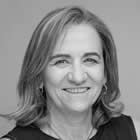 |
| KEYNOTE |
|
 |
| . |
|
|
Maria José Alonso
USC, Spain
Keynote – Plenary Session
María José Alonso’s lab has pioneered numerous discoveries in the field of Nanopharmaceutical Technology and nanomedicine. She has coordinated several research consortia financed by the WHO, the Gates Foundation and the European Commission. Currently, she is involved in 7 international projects. She is the author of over 285 scientific contributions with more than 17,900 cites (H factor 73) and the inventor of 22 patent families. Because of the quality of her scientific articles she has been among the TOP TEN in Pharmacology (Times Higher Education international ranking, 2010) and she is on ‘The Power List’ of the most influential researchers in the field of Biopharmaceuticals (The Medicine Maker, 2020). She is currently Past President of the Controlled Release Society. She also serves on the editorial board of 11 journals and is Editor-in-Chief of the Drug Delivery and Translational Research. In 2006-10, she was the Vice-rector of Research and Innovation of the USC. She is a fellow of the American Institute for Medical and Biological Engineering (AIMBE) and of the Controlled Release Society, a member of three Academies in Spain and a member of the US National Academy of Medicine (NAM).
|
|
|
|
|
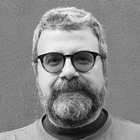 |
| KEYNOTE |
|
 |
| . |
|
|
Giuseppe Battaglia
UCL, UK
Keynote – Plenary Session
Giuseppe Battaglia is Professor of Molecular Bionics. His research is focused on the investigation of the specific design rules behind inter/intramolecular interactions and self-assembly of soft matter systems combining synthetic and supramolecular chemistry. In analogy to medical Bionics, where engineering and physical science converge to the design of replacement and/or enhancement of malfunctioning body parts, Prof Battaglia and his team apply molecular engineering and nanotechnology tools to copy and/or improve biological structures such as viruses for several applications including biotechnology, drug and gene delivery, diagnostic tools and cell engineering scaffolds. He has worked at UCL since 2013. Before this, he held positions as Lecturer -2006, Senior Lecturer -2009 and Professor -2011 in the Departments of Materials Sci. Eng. (2006-2009) and Biomedical Science (2009-2013) at the University of Sheffield. Prof Battaglia holds a Laurea in Chemical Engineering from University of Palermo (Italy) and a PhD in Physical Chemistry from the University of Sheffield.
|
|
|
|
|
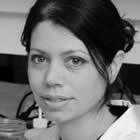 |
| INVITED |
|
 |
| . |
|
|
Ofra Benny
The Hebrew University of Jerusalem, Israel
Invited – Plenary Session
Ofra Benny is a professor in the School of Pharmacy and Faculty of Medicine at the Hebrew University of Jerusalem. She earned her PHD at the Technion in Israel, and did her postdoc studies in Harvard Medical School and Boston Children’s Hospital. Her research lab focuses on rational design of delivery systems that are optimal and respond to specific tissue microenvironments. Using bioengineering, theoretical modelling and tissue engineering we developed a scheme for designing nanoparticles based on their mechanical properties and test their performance using organ on chip technologies.
|
|
|
|
|
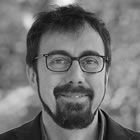 |
| KEYNOTE |
|
 |
| . |
|
|
Alberto Bianco
ibmc/CNRS, France
Keynote – Plenary Session
Dr. Alberto Bianco received his PhD in 1996 from the University of Padova. As a visiting scientist, he worked at the University of Lausanne, the University of Tübingen (as an Alexander von Humboldt fellow), the University of Padova and Kyoto University. He is currently Research Director at the CNRS in Strasbourg. His research interests focus on the design of multifunctional carbon-based nanomaterials for therapy, diagnostics and imaging. In 2017 he has been elected Fellow of the European Academy of Science and in 2019 he has obtained the CNRS Silver Medal. Since 2011 he is Editor of the journal CARBON.
|
|
|
|
|
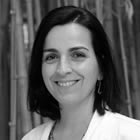 |
| INVITED |
|
 |
| . |
|
|
Maria De la Fuente
Oncomet, Spain
Invited – Plenary Session
Dr. de la Fuente is Principal Investigator of the Nano-Oncology and Translational Therapeutics group of the Health Research Institute of Santiago de Compostela (IDIS), Clinical University Hospital of Santiago de Compostela (CHUS), and part of the cancer research area of the CIBER (CIBERONC). Dr. de la Fuente currently leads a team of 10 members, composed by chemists, pharmacists and biologists. Her research is devoted to develop innovative nanotools to provide solutions to confront one of the biggest current challenges in oncology, metastases, and to advance towards the concept of precision oncology and personalized medicine. She is the Principal Investigator of several national and international projects, leading them at all steps of development. She is also involved in translational activities through the incorporation of a spin-off company, DIVERSA, with the aim of transfer the generated scientific knowledge to the society in the form of products.
|
|
|
|
|
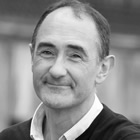 |
| KEYNOTE |
|
 |
| . |
|
|
Luis M. Liz-Marzán
CIC biomaGUNE, Spain
Keynote – Plenary Session
Luis Liz-Marzán is Ikerbasque Professor and Scientific Director at CIC biomaGUNE, in San Sebastian (Spain). He graduated in chemistry from the University of Santiago de Compostela, was postdoc at Utrecht University and Professor at the University of Vigo (1995–2012). He is co-author of over 480 publications and 8 patents, and has delivered over 400 invited lectures. He is currently associate editor of ACS Nano, has been co-editor in chief of ACS Omega and senior editor of Langmuir, and serves in the editorial boards of various other journals, including Science. His major research activity is devoted to understand the growth mechanisms of metal nanocrystals, to tailor their surface chemistry, thereby directing their self-assembly. He also works on the design of biomedical applications based on the plasmonic properties of well-defined metal nanoparticles and nanostructures, including surface enhanced Raman scattering.
|
|
|
|
|
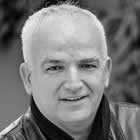 |
| KEYNOTE |
|
 |
| . |
|
|
Arben Merkoci
ICREA / ICN2, Spain
Keynote – Plenary Session
Arben Merkoçi is currently ICREA Professor and director of the Nanobioelectronics & Biosensors Group at Institut Català de Nanociencia i Nanotecnologia (ICN2), a BIST centre situated at Autonomous University of Barcelona (UAB) campus (Bellaterra, Barcelona). After his PhD (1991) at Tirana University, in the topic of Ion-Selective-Electrodes (ISEs) designs and applications in clinical and environmental analysis, Dr. Merkoçi worked as postdoc at other European research centres and USA in the field of nanobiosensors and lab-on-a-chip technologies. His postdoc periods were followed by leading positions in several laboratories: (1997-2006) at Autonomous University of Barcelona and since 2006 in ICN2.
Prof. Merkoçi research is focused on the design and application of cutting edge nanotechnology and nanoscience-based biosensors with interest for diagnostics. These nanobiosensors are based on the integration of biological molecules (DNA, antibodies, cells and enzymes) and other (bio)receptors with micro- and nanostructures and applied in diagnostics, environmental monitoring or safety and security. He has published around 300 peer review research papers, is editor of books (“Nanomaterials Based Biosensing Systems, by Wiley; “Electrochemical Sensor Analysis”, of Comprehensive Analytical Chemistry series by Elsevier etc.), book chapters and special journals issues (Lab on a Chip, Electroanalysis, Microchimica Acta) dedicated to the field of nanomaterials integration and applications in biosensors.
Prof. Merkoçi is Editor of Biosensors and Bioelectronics, the principal international journal devoted to research, design development and application of biosensors and bioelectronics, member of editorial board of Electroanalysis, Microchimica Acta and other journals.
|
|
|
|
|
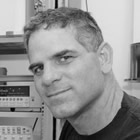 |
| INVITED |
|
 |
| . |
|
|
Danny Porath
The Hebrew University of Jerusalem, Israel
Invited – Plenary Session
Prof. Danny Porath Studied for BSc in Physics, Mathematics and Electronics at the Hebrew University. Received his Ph.D in Physics from the Hebrew University in 1997. Did his postdoc at Delft University of Technology with Prof. Cees Dekker and established his group at the Institute of Chemistry of The Hebrew University of Jerusalem in 2001. The group research interests include: DNA-Based Nanoelectronics, scanning probe microscopy and spectroscopy of single molecules, electrical transport measurements in single molecules, nanoelectronics, DNA sequencing and biomarker detection. Member of the Editorial Board of “Self Assembly and Molecular Electronics and of “Scientific Report” from Nature Publishing Group. Received excellent postdoctoral award of the American Vacuum Society Meeting, Boston 2000, and The Israel Chemical Society Prize for the Outstanding Young Scientist in 2007. Holds the Etta and Paul Schankerman Chair of Molecular Biomedicine since 2014. Served as the Director of the Hebrew University Center for Nanoscience and Nanotechnology 2011-2014. Currently serves and the Vice Dean Research of the Faculty of Science.
|
|
|
|
|
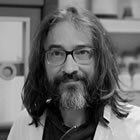 |
| KEYNOTE |
|
 |
| . |
|
|
Victor Puntes
ICN2, Spain
Keynote – Plenary Session
Prof. Puntes completed his undergraduate studies in chemical engineering and materials science at the Université Louis Pasteur Strasbourg (France) and the Universitat Autonoma de Barcelona (UAB). In 1998, he earned his PhD in physics from the Universitat de Barcelona (UB), working with Prof. Xavier Batlle and Prof. Amilcar Labarta on giant magnetoresistance in granular alloys. He then spent over three years at the University of California, Berkeley (USA) and the Lawrence Berkeley National Laboratory (LBNL, USA) in the groups led by Prof. Paul Alivisatos and Prof. Kannan Krishnan, working on the synthesis and control of nanostructures. In 2003 he returned to Catalonia with a Ramon y Cajal research grant at the UB. In 2005 he obtained an ICREA professorship at the then ICN (now ICN2) to create the Inorganic Nanoparticles Group, which he currently leads.
|
|
|
|
|
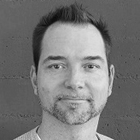 |
| KEYNOTE |
|
 |
| . |
|
|
Samuel Sanchez
IBEC, Spain
Keynote – Plenary Session
Samuel is since 2015 a Research Professor at the Institute for Bioengineering of Catalonia (IBEC) and the Catalan Institute for Research and Advanced Studies (ICREA) in Barcelona, Spain. Currently he acts as Deputy Director for the Internationalization of IBEC. Before that, he worked at the Max Planck Institute for Intelligent Systems in Stuttgart, IFW Dresden, Germany, MANA-NIMS in Japan. His work spans from fundamental aspects of catalytic and biocatalytic nano-micromotors, 3D Bioprinted BioBOTS, electrochemical biosensors to applications in biomedical and environmental fields. He received several awards and recognitions such as the MIT TR35 as Top Innovator Under 35 in the Spanish edition, Guinness World Records in 2010 and 2017, the Princess of Girona Scientific Research Award 2015 and the National Research Award for Young Talent 2016 by the Catalan Foundation of Research among others. He received the ERC-Starting Grant in 2013, and two ERC-Proof-of-concept in 2016 and 2017. He has published about 130 papers with h-index of 48 and he has filed 6 patents.
|
|
|
|
|
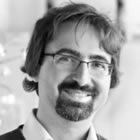 |
| KEYNOTE |
|
 |
| . |
|
|
Francesco Stellacci
EPFL, Switzerland
Keynote – Plenary Session
Francesco Stellacci got his degree in Materials Engineering at the Politecnico di Milano in 1998. He then moved as a post-doc in the Department of Chemistry at the University of Arizona. There he developed a technique to microfabricate silver structures in polymeric matrices that was later licensed to 3M. In 2002 he became as assistant professor in the Department of Materials Science and Engineering at Massachusetts Institute of Technology (MIT, Cambridge, USA), where he was promoted to the ranks of associate professor without (2006) and with (2009) tenure. There he developed a method to fabricate DNA microarrays that served as the key for a start-up called “Molecular Stamping” that existed for six years. In 2010, he moved as a full professor in the Institute of Materials and in the Interfaculty Bioengineering Institute at EPFL where he holds the Constellium chair. In 2014, Stellacci founded the Food and Nutrition Center at EPFL, an interdisciplinary center that fosters research in various aspects of the food chain. In 2017, Stellacci discovered novel additives to keep viral vaccines thermally stable for up to two months at room temperature. This is a key discovery to lower the price of vaccinations programs in developing countries. He decided not to patent his discovery so that its use would be free of charge for anybody interested. In recent years, Stellacci has focused on the development of novel antivirals both nanoparticles and small molecules. In 2019 he has founded a company (Asterivir) to bring them through clinical trials. Stellacci was one of the three founders of the RSC journal “Nanoscale”, one of the top five journals in the field on Nanotechnology. He has won numerous awards, among them, the Technology Review TR35 ’top innovator under 35’, the Popular Science Magazine ’Brilliant 10’, and the EMRS EU40. He is a Fellow of the Royal Society of Chemistry, of the Global Young Academy, and of the European Academy of Sciences.
|
|
|
|
|
| |
|
|
|
|
|
|
|
© Phantoms Foundation 2020 |
|
|
|